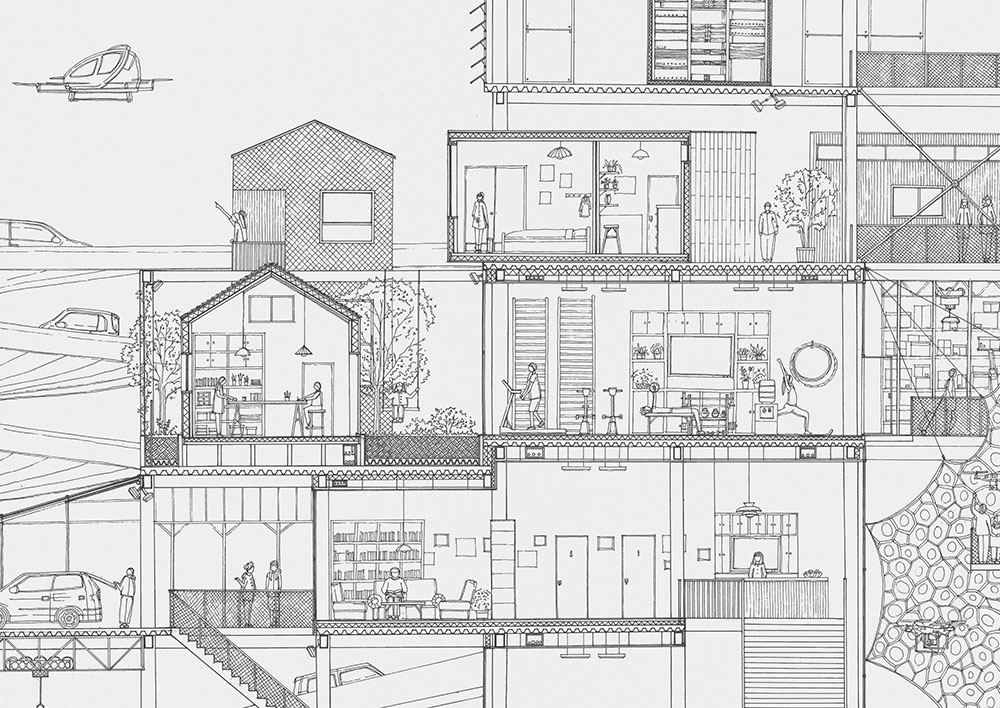The BA at Manchester School of Architecture launches with a deeply immersive and energetic programme which integrates Studio, Humanities, and Technologies; so that our students can find out for themselves what becoming an architect might mean for them.
After establishing their skillset in year one, second-year MSA students begin practicing independently, learning how to develop and articulate their own positions and to shape their own trajectory. This builds a momentum towards third-year when students select their own programme. There are nine Humanities electives and students choose between one of seven flag ship Ateliers (vertical Studios) working alongside postgraduate students from MArch for the year, with a team of 4 research-active staff and 4 external practitioners.
What sets the MSA undergraduate programme apart from other schools of architecture is a citizen pedagogy that engages students in live projects and real-world challenges, from mitigating climate change to constructing a more inclusive public realm. Throughout the 3-year BA programme, our students are supported in identifying what their own matters of concern and care are, both as citizens and as emerging professionals. Our teaching centres on research through speculative design and our staff mobilise their research-practice to develop immersive briefs that engage and challenge.
Manchester, since the birth of the industrial revolution, has continually made and remade itself, leading to its identity as a radical city and this is reflected in socially and politically engaged designs across the BA programme. There is no ‘school style’ at MSA, the student work encompasses an eclectic range of personal and cultural perspectives, is inquisitive, highly creative and truly diverse.
To make tomorrow’s cities, architects and urbanists will need a different understanding and new ways of making architecture if they are to engage citizens meaningfully in the transformation of their cities. To achieve this we have made some substantive changes to our programme this year with the establishment of four new roles: a Head of Humanities, Climate Action lead, two Skills leads (analogue and digital) and the introduction of new lecture series and an additional half day of studio to explore new design methods to the BA programme for both first and second years.
Based on the idea that a site is made and not found, the new Analogue Skills workshops teach improvisational design methods. Students experiment with new ways of developing their designs through doing and making: experimenting with photography, collage and juxtaposition as design tools, learning through redrawing and model-making. Through this programme, testing ideas and positions, students are developing in their Studio, Technology and Humanities projects week by week, leading to a renewed interest and deeper engagement with the design journal as a tool.
The new Humanities lecture series ‘Writing the City’ considers the wider responsibilities of Architecture and Urbanism beyond the bounds of the site and interrogates the ethics of architectural practice for cities across the globe including: Seoul, Accra, Jakarta, Tokyo and Guayaquil. A critical understanding of climate change is comprehensively addressed this year with a new lecture series ‘Architecture, Climate and Society’. The focus is on students developing an informed position on climate change, shifting the discussion from resources materials/technological solutions to the ethical, social and political issues in design posed by the climate crisis.
This has been an extraordinary year for us all during the pandemic with enforced lock-downs, losing access to our buildings and the sense of community that affords. It is something we have been through together and felt keenly. In spite of these challenges, it has heightened our students’ sense of enquiry. The innovation and imagination in their work in the BA is a testament to the agility and determination of our students and their diverse ambitions to make the world a better place for all. To some extent, this experience has made us all stronger and will stand everyone in good stead in their future careers.


